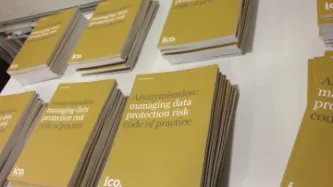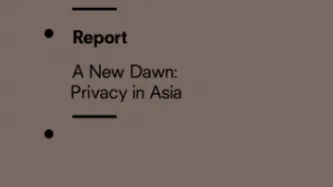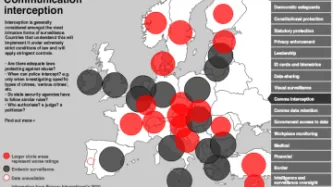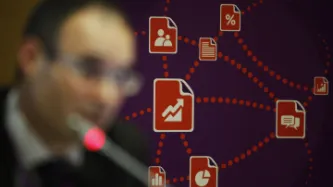Search
Content type: News & Analysis
Privacy International welcomes the judgment of the European Court of Human Rights in Catt v the United Kingdom.The Court found that the UK violated the right to privacy (Article 8 of the European Convention on Human Rights) of Mr John Catt, a peace movement activist, who despite having never being convicted of any offence, had his name and other personal data included in a police database known as the “Extremism Database”. The Court found problematic "the variety of definitions of…
Content type: State of Privacy
Table of contents
Introduction
Right to Privacy
Communication Surveillance
Data Protection
Identification Schemes
Policies and Sectoral Initiatives
Introduction
Acknowledgement
The State of Privacy in Argentina is the result of an ongoing collaboration by Privacy International and Asociación por los Derechos Civiles (ADC).
Key Privacy Facts
1. Constitutional privacy protections: While Argentina's constitution does not mention the word 'privacy', Section 19 has been taken by the…
Content type: News & Analysis
On 22 January 2019 Google updated its Terms of Service and Privacy Policy for Europe.
The message is quite reassuring:
“Nothing about your experience in Google services will change. And nothing is changing in terms of your privacy settings, the way your data is processed, nor the purposes of its processing”.
Then it says: “However, if you don’t want to accept these changes in our terms and Privacy Policy, you can choose to stop using the applicable services.”
Simple. If you don’t like it,…
Content type: News & Analysis
We found this image here.
In order for GDPR to be effective at protecting people's data, it must be implemented and enforced. Therefore, we are pleased to see that CNIL has taken action and issued Google a fine of €50 million based on complaints by NOYB and La Quadrature Du Net in May 2018. Despite numerous statements by Google that it takes the protection of people's data seriously, the decision demonstrates that they have a long way to go and that regulators will take action to hold…
Content type: News & Analysis
Federal law enforcement is deploying powerful computer hacking tools to conduct domestic criminal and immigration investigations.
By Alex Betschen, Student Attorney, Civil Liberties & Transparency Clinic, University at Buffalo School of Law
Hacking by the government raises grave privacy concerns, creating surveillance possibilities that were previously the stuff of science fiction. It also poses a security risk, because hacking takes advantage of unpatched vulnerabilities in our…
Content type: Press release
FOR IMMEDIATE RELEASE
December 21, 2018
CONTACTS:
Alex Betschen, Civil Liberties & Transparency Clinic, [email protected], 716–531–6649
Colton Kells, Civil Liberties & Transparency Clinic, [email protected], 585–766–5119
Abdullah Hasan, ACLU, [email protected], 646–905–8879
NEW YORK — Privacy International, the American Civil Liberties Union, and the Civil Liberties & Transparency Clinic of the University at Buffalo School of Law filed a lawsuit today…
Content type: News & Analysis
Photo credit: US Immigration and Customs Enforcement
The trial of Mexican drug lord Joaquin “El Chapo” Guzman started in New York back in November 2018. But last week, the jurors were presented with a trove of new key evidence: dozens of text messages exchanged between Guzman, his wife, and his mistresses.
The reason behind this set of revelations? Guzman had been spying on his wife and mistresses, using publicly-available surveillance software called FlexiSpy. Once installed on his targets…
Content type: Explainer
Photo credit: warrenski
Mandatory SIM card registration eradicates the potential for anonymity of communications, enables location-tracking, and simplifies communications surveillance and interception. By facilitating the creation of an extensive database of user information, it places individuals at risk of being tracked or targeted, and having their private information misused. In the absence of comprehensive data protection legislation and judicial oversight, SIM users' information can be…
Content type: News & Analysis
Privacy International’s campaign for effective export controls of surveillance technology is still ongoing, but for one company, action can already be taken by HM Revenue & Customs to hold stop their unethical practices. Here is the story so far...
Privacy International has been investigating the trade in surveillance technology for almost two years as part of our Big Brother Incorporated project. Our research showed the capabilities of surveillance technology has grown hugely in the…
Content type: News & Analysis
It was only last year that women in Saudi Arabia finally gained the right to vote. However, it seems a sad case of ‘one step forward, two steps back’, as this year it was discovered that all Saudi women are being electronically tracked by their male ‘guardians’, who are automatically sent text messages when their female ‘dependants’ attempt to cross the border. For women seeking to escape abusive relationships, or simply the severe generalised oppression of women that operates…
Content type: News & Analysis
A full analysis of the UK Information Commissioner's "Anonymisation code of practice: managing data protection risk" will take time and working knowledge of how the code is used in practice.
At the launch, the ICO signalled that while they believed the code was now up to scratch, they were open to additions and clarifications given that it is the first document of its kind in the world. We applaud them for this; the code is likely to be copied internationally, so it is particularly…
Content type: Report
Privacy has truly become an issue of global resonance. A quick glance at policy agendas in countries around the world shows that privacy and surveillance issues are increasingly important. The challenge, however, is improving the ability of governments and policy stakeholders to engage in a policy debate that is informed about the dangers of surveillance and the importance of protecting privacy. This is the primary objective of our Privacy in the Developing World programme.
In this report, we…
Content type: News & Analysis
Next week, the European Parliament will make an important decision affecting one of the world’s most vulnerable and stigmatised groups of people: asylum seekers. This decision is part of a larger debate about privacy and function creep, about authorities breaking promises that were made when personal information was collected and using it for new purposes.
EURODAC, a transnational database containing the personal and biometric information of all asylum seekers and illegal immigrants found…
Content type: News & Analysis
Twelve years after the Regulation of Investigatory Powers Act (RIPA) was passed by the UK Parliament, permitting the interception of communications without a judicial warrant and allowing the police to self-authorise access to communications metadata, some parts of this dangerous law are finally being properly scrutinised. This isn't an intentional review, but rather a by-product of a joint parliamentary committee's interrogation of the draft Communications Data Bill, the Home Office's…
Content type: News & Analysis
Today we launch the public consultation process for the International Principles on Communications Surveillance and Human Rights. From now until January 3rd, we are inviting comments and suggestions on the draft principles.
The rationale behind these principles is to provide civil society, industry and government with a framework against which to evaluate whether current or proposed surveillance laws and practices are consistent with human rights. Now more than ever, we need greater…
Content type: Report
Privacy has truly become an issue of global resonance. A quick glance at policy agendas in countries around the world shows that privacy and surveillance issues are increasingly important. The challenge, however, is improving the ability of governments and policy stakeholders to engage in a policy debate that is informed about the dangers of surveillance and the importance of protecting privacy. This is the primary objective of our Privacy in the Developing World programme.In this report, we…
Content type: News & Analysis
Last month, US District Judge William Griesbach ruled that police can lawfully install covert digital surveillance cameras on private property without a warrant. Officers of the Drug Enforcement Agency had entered a property belonging to Marco Magana, which was littered with ‘no trespassing’ signs and behind a locked gate, and installed hidden cameras without the consent or knowledge of either the occupant or a court of law. In what has been described by Salon as “yet another…
Content type: News & Analysis
There have been two rounds of meetings in 2012 of the OECD Committee for Information, Computer and Communications Policy (ICCP) and some of its working parties – in May and October 2012, with further meeting of two working parties in December. A ‘foresight forum’ on the ‘big data’ theme was held on 22 October. Civil society interest in the ICCP work programme is formalised through the Civil Society Information Society Advisory Council (CSISAC).
The Working Party on Information Security…
Content type: News & Analysis
One of the first things that strikes you about the chaotic East African metropolises of Kenya, Uganda and Zimbabwe is the blanket of adverts for mobile phone companies that covers them, from the walls of the immigration hall at Harare airport, to the rickety shacks that line the dusty streets of Kampala. Where official signage is unavailable, DIY versions are painted onto the roofs and walls of houses and small businesses. Stores selling mobile phones are rarely more than a few short steps away…
Content type: News & Analysis
Privacy International is proud to announce our new project, Eyes Wide Open, which aims to pry open the Five Eyes arrangement and bring it under the rule of law. Read our Special Report "Eyes Wide Open" and learn more about the project below.
For almost 70 years, a secret post-war alliance of five English-speaking countries has been building a global surveillance infrastructure to “master the internet” and spy on the worlds communications. This arrangement binds together the US, UK, Canada,…
Content type: News & Analysis
Communications surveillance is one of the most significant threats to personal privacy posed by the state. This is why many statements of fundamental rights across the world give special regard to the privacy of communications. For example, the Universal Declaration of Human Rights states in Article 12:
No one should be subjected to arbitrary interference with his privacy, family, home or correspondence, nor to attacks on his honour or reputation. Everyone has the right to the protection of…
Content type: News & Analysis
Privacy International asked lawyers, activists, researchers and hackers at Defcon 2012 about some of the debates that thrive at the intersection between law, technology and privacy. We also wanted to know why privacy matters to them, and what they thought the future of privacy looked like. This video is a result of those conversations.
Featuring Cory Doctorow, Kade Crockford, Jameel Jaffer, Dan Kaminsky, Chris Soghoian, Marcia Hoffman, Moxie Marlinspike, Phil Zimmerman, Hanni Fakhoury…
Content type: News & Analysis
Large institutions tend to focus internally, with minimal regard to the external environment. Open Databecoming institutionalised is not different, and as a leading edge country in opening data, the UK is making the predictable mistakes first:
The UK’s Department for Education (DfE) is currently considering opening data from the National Pupil Database. At a preparation event for this initiative, at which some data was released for use in an ‘appathon’, one participant believed he…
Content type: News & Analysis
Let's be clear: the Open Data movement is not about the pursuit of complete and unconditional openness. We know that it would be unwise to publish details of police patrol patterns, or the combination to the safe containing the crown jewels. We believe that fundamental reference data like ordnance survey maps, transport timetables, and company information should be freely available to all - information about objects, rather than information about people. Internationally, slightly different…
Content type: News & Analysis
We welcome the Informational Commissioner's intention to produce guidance for data controllers around the production of Open Data. Rigorous guidance is sorely needed in this area, with even large Government departments getting it dangerously wrong. Some data can be released safely in some circumstances; depending on the type and there has been sufficient consideration of the nuance of the situation. Adequate anonymisation is exceptionally difficult, and reidentification is possibly using…
Content type: News & Analysis
On the surface, it’s all about protecting Russian kids from internet pedophiles. In reality, the Kremlin’s new “Single Register” of banned websites, which goes into effect today, will wind up blocking all kinds of online political speech. And, thanks to the spread of new internet-monitoring technologies, the Register could well become a tool for spying on millions of Russians.
Signed into law by Vladimir Putin on July 28, the internet-filtering measure contains a single, innocuous-sounding…
























